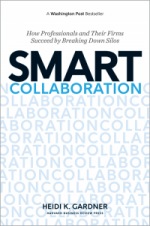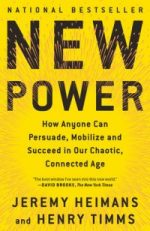Collaborative decision-making is my default setting. So familiar to me that I barely notice doing it.
Two books have brought that position into sharper focus for me recently.
 The first, Smart Collaboration by Heidi Gardner, makes a business case for collaboration. She argues that it makes financial sense and is a smart business and career move. Her context is professional services companies — more specifically law firms. She unpacks evidence justifying why collaborative practice is a good idea, for lawyers, partners in their firms, and their clients.
The first, Smart Collaboration by Heidi Gardner, makes a business case for collaboration. She argues that it makes financial sense and is a smart business and career move. Her context is professional services companies — more specifically law firms. She unpacks evidence justifying why collaborative practice is a good idea, for lawyers, partners in their firms, and their clients.
The book stopped me up short, because she needed to write a whole book explaining why collaboration is a good idea. I assumed that in my circles with public benefit organizations and coalitions, that’s a book few people would read, because collaboration is taken for granted. It’s “table stakes.” In fact, my people tend to need to be reminded of the opposite: that collaboration should have a clear purpose and metrics and not just occur for its own sake.
 Enter book number two: New Power by Jeremy Heimans and Henry Timms. They contrast the “old power” of expertise and exclusivity with the “new power” of collaboration, participation and open sourcing. In the emerging world these authors describe, collaboration is pushed well beyond my usual comfortable boundaries, as recounted in stories of “radical transparency” in US political candidacies, participation overtly trumping excellence as a value in a church in Colorado, and crowdsourced car construction courtesy of a new firm called Local Motors.
Enter book number two: New Power by Jeremy Heimans and Henry Timms. They contrast the “old power” of expertise and exclusivity with the “new power” of collaboration, participation and open sourcing. In the emerging world these authors describe, collaboration is pushed well beyond my usual comfortable boundaries, as recounted in stories of “radical transparency” in US political candidacies, participation overtly trumping excellence as a value in a church in Colorado, and crowdsourced car construction courtesy of a new firm called Local Motors.
You don’t have to look very far to find someone whose situation is more or less extreme than your own. And like refining the focus setting on a telescope or an old-fashioned slide projector, doing so helps to bring your own position into greater clarity.
In your context, do you need to make a case for collaboration as a radical new idea requiring justification? Or is radical participation closer to your norm? And where do your personal views sit in relation to those of your organization or culture?
Wiser decisions faster can only happen if we’re in tune with what makes them “wise” or “fast” in the first place. Pay attention to the conditions under which collaboration lands them in those categories.
